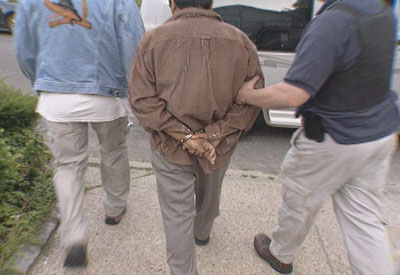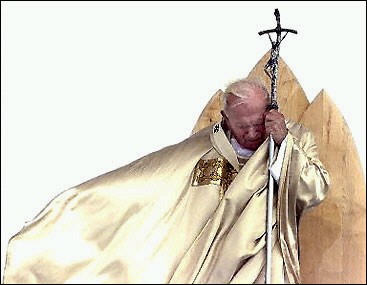Peter and Judas: A Lesson in Mercy and Hope
Peter trusted in God's mercy - Judas did not.
In the Passion according to St. Mark we notice the parallel between Judas and Peter. Superficially, Peter and Judas have the same fate. Both betrayed Our Lord, both recognized their own guilt and felt remorse, both received Jesus' love even after the betrayal: A look. A kiss. Where is the difference? Why do we have such dramatically different endings given the seemingly equal fate of both apostles? The difference lies in this only: Peter trusted in God's mercy - Judas did not.
We know that the Evangelist Mark became some kind of "secretary" to Peter in Rome later on. His gospel rests primarily on statements and witness accounts of Peter. Peter, himself, spread the story of his denial. He made it known to everyone, and his sermons became a kind of "public confession".
Why?
Perhaps Peter wanted to give hope to all those who like him betrayed and denied Our Lord. Perhaps, he wanted to tell all those who would also fall like him about the forgiveness he received and say:
- No sin is so grave that Our Lord could not forgive it;
- No betrayal of God can be so great that the God's mercy could not be greater
- No denial can be so shameful and humiliating that we should despair over it.
And when Peter says this, it is not an empty phrase but his very own experience of God's mercy. At the Last Supper Jesus predicted that Peter would deny Him three times, and Peter boasted: "And if I were to die with you - I will never deny you."
But several hours later - after Jesus had been arrested - this cocky announcement turned into a three-fold betrayal: "I don't know this person...."
PETER AND JUDAS
In the Passion according to St. Mark we notice something else: the parallel between Judas and Peter.
The Gospel tells us what happened after the denial of Peter: "The Lord turned and looked at Peter. ..... And he went out and wept bitterly." (Lk. 22:61)
Not only did Jesus predict His denial by Peter but also His betrayal by Judas. He did not just look at Judas, but even kissed him. Judas left and hanged himself. (Mt. 27:5)
Superficially, Peter and Judas have the same fate. Both betrayed Our Lord, both recognized their own guilt and felt remorse, both received Jesus' love even after the betrayal: A look. A kiss. Where is the difference? Why do we have such dramatically different endings given the seemingly equal fate of both apostles?
The difference lies in this only: Peter trusted in God's mercy - Judas did not.
REAL CONTRITION INSTEAD OF SELF-PITY
Betraying Jesus wasn't the worst that Judas did. As despicable as this act was, it did not lead to Judas' tragic demise. His downfall was that he had lost hope. He either did not believe in forgiveness, or he did not trust that this forgiveness would be given him; or he decided that he could not or would not forgive himself, in which case he gave himself up into hopelessness and despair.
It may seem that his despair was proof of his great sorrow over betraying his friend and master. Repentance, however, is something completely different. Repentance is always a great benefit for our soul. Real repentance leads us back, leads us to forgiveness; real repentance is a special kind of love towards the person one has betrayed.
If we are just disappointed with ourselves and our failure, this is not real repentance but simply pride. Then we are giving ourselves up in hopelessness and calling it our just punishment.
Self-pitying sorrow is not desired by Jesus. It is not proof of my love for Him when I claim apparently with contrition: "I don't deserve to be forgiven..." or "I just cannot forgive myself...." If I cannot forgive myself it simply means that I prefer my wounded pride over His suffering Love.
TRUE HUMILITY INSTEAD OF DESPAIR
After he betrayed Jesus, Peter may have wished to die, just like Judas. For a moment it may have seemed the only way out of his guilt. The difference, however, was that Peter chose hope while Judas chose despair. Judas refused that forgiveness which he also could have received. His fate was not sealed by a kiss, but by his pride.
Every single one of his apostles left Jesus that night, denied him and betrayed him somehow. Judas' sin, however, receives more attention because it seems more scandalous than the others. If we just focus on Judas' greed we miss the true lesson behind it.
All the apostles let Jesus down in various ways, just as we do all the time. Somehow they all betrayed him, just as we do all the time also. Surely, they were all sad, scared and full of remorse over their sins, just as we are. But only Judas preferred his guilt over redemption. In his pride he preferred death over humbly asking for forgiveness.
That is the great lesson for our faith: How often do we wallow in self-pity and think we are really humble. Self-pity has nothing to do with humility, nor with repentance. Humility is always ...truth, and the truth is: we sinned. And we will sin again.
And there is only one way to make up for it, to "undo" it. We have to truly and honestly repent, humbly throw ourselves into Our Lord's arms - in the Sacrament of Confession. Judas lacked in hope because he lacked in humility.
And Jesus takes us up into His arms. He gazes at us full of mercy, just as He gazed at Peter full of mercy. It is not important how often we fail or fall - provided we return to Him every time full of hope and humility.
TRUST IN GOD'S MERCY
Scripture reports again and again how we betray God - and how the endings are so different:
Cain killed his brother Abel, but David also murdered Uria whose wife he had an affair with.
Cain came out of this story as a despicable sinner, and David as a saint.
Cain fell into despair due to his sin; he thought his sin was too great for it to be forgiven. David trusted in God's mercy and called on His forgiveness.
The same story repeats itself over and over - all the way to Golgotha: two thieves are being crucified together with Jesus. One of them curses and despairs. The other one asks forgiveness: "Jesus, remember me when you come into your kingdom." (Luke 23:42). And he receives the most beautiful promise that a man can ever receive: "Amen, I say to you: Today you will be with me in paradise." (Ibid.)
It is one thing for God to give forgiveness and redemption, and it is another for us to accept His forgiveness and redemption, especially through the Sacraments of Baptism, Penance and the Holy Eucharist.
And that requires humility: Peter had to learn that humility, he had to understand that he cannot give redemption and forgiveness to himself, but that Jesus' suffering for him it is a gift of God's mercy.
May God give us that humility also, that in the hour of death we may not despair in light of our sins, but that we may unconditionally trust in God's mercy and throw ourselves into His loving arms.
-----
Jennifer Hartline is a contributing writer for Catholic Online. Fr. Bernhard Speringer is a priest of the Order of Canons Regular of the Holy Cross in Austria. This collaborative effort was also published on Kath.net.
- - -
Catholic Online asks that you join with us and help in this vital mission by sending this article to your family, friends, and neighbors and adding our link (www.catholic.org) to your own website, blog or social network. Let us broadcast, we are PROUD TO BE CATHOLIC!









